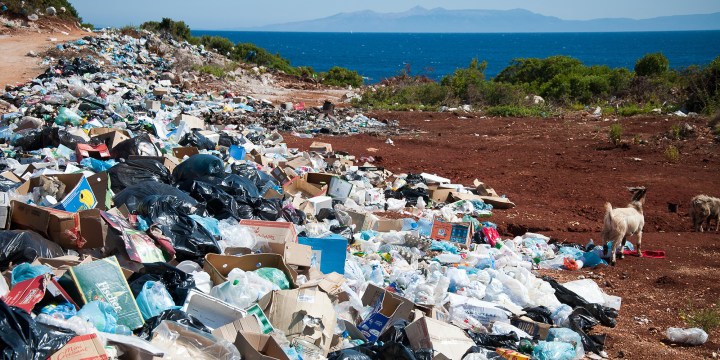MARINE MENACE
South Africa’s plastic pollution strategy is subpar, says new report

As levels of plastic pollution in South Africa’s marine ecosystems steadily rise, so too does the level of concern about the plastics problem. The country has taken steps to minimise plastic waste that finds its way into the sea, but a new report suggests the current strategies will do little to reduce levels of plastic pollution by 2040.
Without intervention current plastic pollution levels could double by 2040 and South Africa’s strategy to address its plastic problems will do little to reduce pollution levels, according to new research.
The Council for Scientific and Industrial Research (CSIR) released the South African Pathways report on Tuesday, indicating that while marine plastic pollution only accounts for 14% of plastic waste, plastic management in South Africa has room for improvement.
Modelling plastic management
“Plastic pollution is a symptom of waste mismanagement,” says the report, which used the Breaking the Plastic Waves Pathway Tool to analyse the disposal of plastic pollution. This tool accounts for the three main components of plastic pollution – open burning of plastic waste, land pollution and marine pollution.
The data were used to model different scenarios for the future of South African plastic management.
The Extended Producer Responsibility (EPR) model is based on the current plastic pollution management practised in South Africa. It assumes that the EPR regulations, which govern the country’s five-year targets for collection and recycling of paper and packaging, are implemented and enforced.
The report indicates that achieving the legislated EPR recycling targets for plastics will cut down 33% of total plastic pollution in South Africa by 2040. However, the reduction of plastic pollution through collection and recycling as regulated by the EPR does not mitigate the growth of plastics consumption.
An integrated approach
The Optimal System Change (OSC) model is the best-case scenario which tries to identify the most sustainable management strategy that South Africa could adopt. It balances the need to reduce plastic waste with the need to preserve jobs.
The report identifies three main strategies that are integrated in the OSC approach. First, reduce demand and substitute plastic products; second, reuse and recycle; third, collect and safely dispose of plastic waste.
The OSC model differs from the EPR model because it recognises the need to implement a combination of strategies to manage plastic pollution in South Africa.
Read in Daily Maverick: “Take the wrap — to cut plastic waste out of your life, start small”
Over the same period to 2040, the OSC model will reduce total plastic pollution by as much as 63%. This scenario has the added benefit of reducing 37% of predicted greenhouse gas emissions, reduces investment in management by up to 67% and increases job opportunities in the waste management industry by 3%.
Not far enough
Despite its findings that South Africa’s plastic management strategy falls short, the report does not go far enough, according to Nhlanhla Sibisi, a climate and energy campaigner for Greenpeace Africa.
The report predominantly discusses plastic waste, says Sibisi, who notes that the totality of the lifecycle of plastic should be factored into management policy.
“About 99% of plastic is a byproduct of fossil fuels such as oil.”
Essentially, plastic is made of fossil fuels and their production emits greenhouse gases, explains Sibisi. Greenhouse gases are the leading driver of climate change.
Plastics contribute to climate change across their entire lifecycle and have a large carbon footprint, explains Lorren de Kock, the programmes manager of the circular plastics economy for World Wildlife Fund South Africa.
Visit Daily Maverick’s home page for more news, analysis and investigations
“There are failures at every single stage,” says De Kock, explaining that plastics are made from fossil fuels, for single use, to then be thrown away – plastic has no real value – the “true cost of plastic and its impact on the environment and human health isn’t factored into its price”.
“Waste is just a symptom of the failure of the whole value chain of plastics and we can’t just look at waste management,” explains De Kock.
“The government should push to ban single-use plastic,” says Sibisi. “Each piece of single-use plastic is only used for 15 minutes on average.”
Very little plastic is made to be recycled and the report does not factor in product design such as making plastic products more suitable for reuse or recycling, adds De Kock.
Read in Daily Maverick: “Focus on single-use plastics ignores the greater hazard of microplastic contamination”
But the South African Pathways report’s findings are indicative of what needs to be done. The models show that the current EPR strategy is not sustainable and a multipronged management approach would be better to effectively combat the growing plastic levels.
The biggest way to reduce the impacts of plastic is to reduce and substitute plastic for more sustainable alternatives such as paper or glass. Collection and recycling would then be important to mitigate the plastic already in use, says De Kock. But safe disposal is also key and these solutions must be implemented together to begin addressing the issue, she adds.
“… you can’t just rely on the EPR to solve the problem; ultimately we just can’t handle the amount of material coming at us.” DM/OBP






















 Become an Insider
Become an Insider
To a certain extent the plastics problem has been accentuated by those who yell “save a tree”. Paper, most certainly in South Africa, is made from a renewable resource, Eucalyptus and Pinus species that are grown in plantations in the warmer coastal areas of our country.